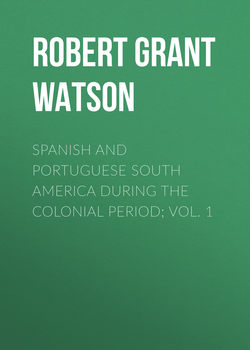Spanish and Portuguese South America during the Colonial Period; Vol. 1

Реклама. ООО «ЛитРес», ИНН: 7719571260.
Оглавление
Robert Grant Watson. Spanish and Portuguese South America during the Colonial Period; Vol. 1
PREFACE
CHAPTER I. INTRODUCTORY
CHAPTER II. THE DISCOVERY OF THE PACIFIC OCEAN
CHAPTER III. THE COLONY OF DARIEN; FATE OF VASCO NUÑEZ
CHAPTER IV. LAS CASAS; HIS COLONY ON THE PEARL COAST
CHAPTER V. BRAZIL; THE PLATE; AND PARAGUAY
CHAPTER VI. DISCOVERY OF PERU
CHAPTER VII. CONQUEST OF PERU
CHAPTER VIII. CHILI
CHAPTER IX. BRAZIL; FAILURE OF THE FRENCH AT RIO DE JANEIRO
CHAPTER X. PERU; SUPREMACY OF GONZALO PIZARRO
CHAPTER XI. PERU; THE PRESIDENT GASCA
CHAPTER XII. THE ARAUCANIAN WAR
CHAPTER XIII. THE ARAUCANIAN WAR—(continued). THE GOVERNMENT OF DON GARCIA DE MENDOZA
CHAPTER XIV. THE ARAUCANIANS
CHAPTER XV. BRAZIL
CHAPTER XVI. ESTABLISHMENT OF THE JESUITS IN PARAGUAY
CHAPTER XVII. ENGLISH NAVIGATORS IN SOUTH AMERICA, HAWKINS, DRAKE, AND RALEIGH
APPENDIX
Отрывок из книги
The following account of the Colonies from which sprang the States of South America owes its origin to the want of such a work felt by myself some years ago. In 1866 I received the appointment of second Secretary to Her Majesty’s Legation in the Argentine Republic and Paraguay. My previous experience having been in quite another part of the world, I had all to learn respecting the regions which I was about to visit. The only book which had been recommended to me was Sir Woodbine Parish’s work on Buenos Ayres. On reaching my destination, however, I found that this work was already out of date; I also found that there was a considerable amount of literature respecting South America. But this literature being partly in English, French, German, Dutch, Latin, or Italian, and partly in Spanish or Portuguese, was only accessible to persons possessing a reading knowledge of the above-named languages.
Of two years in South America I passed one as Secretary at Buenos Ayres, and the other in a similar capacity at Rio de Janeiro. During the first year I was sent up the Uruguay and to the Province of Santa Fè; then to the Welsh colony on the Chupat river in Patagonia; and, lastly, to the then seat of war in Paraguay: in the second year I went on a mission to the Province of Minas Geraes in Brazil. I had thus opportunities of seeing different parts of the continent, and of becoming more impressed with the want of a work giving anything like a complete account of them.
.....
With four vessels, Ojeda set sail for the Canaries, in 1502, and thence proceeded to the Gulf of Paria, from which locality he found his way to Coquibacoa. Not liking this poor country, he sailed on to the Bay of Honda, where he determined to found his settlement, which was, however, destined to be of short duration. Provisions very soon became scarce; and one of his partners, who had been sent to procure supplies from Jamaica, failed to return until Ojeda’s followers were almost in a state of mutiny. The result was that the whole colony set sail for Hispaniola, taking the governor with them in chains. All that Ojeda gained by his expedition was that he at length came off the winner in a lawsuit, the costs of which, however, left him a ruined man.
We have now once more, in following according to time the progress of discovery towards the Isthmus, to return to the voyages of Columbus. He was already sixty-six years of age when he embarked on his fourth and last voyage. His squadron, consisting of four small caravels, set out from Cadiz on the 9th of May 1502, and, after some delay on the coast of Morocco, reached the Caribbee Islands on the 15th of June. Having been refused admission to enter the port of San Domingo, Columbus, after riding out a fearful storm, sailed for some time along the coast of Honduras, with the object, which was ever before him in this expedition, of finding a supposed strait opening out into the Indian Ocean. On the 17th of October he arrived off the coast of Veragua, where he found the natives possessed of many ornaments of gold. The Spaniards likewise found in this quarter the first signs of solid architecture which they had discovered in the New World.
.....